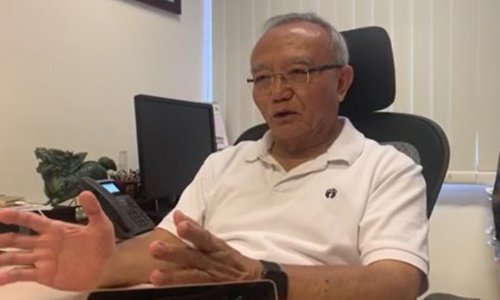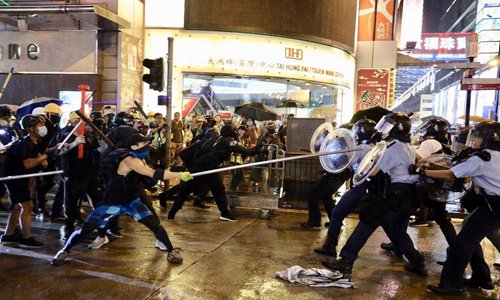HOME >> CHINA
HKers need ‘pragmatic political view’
By Chen Qingqing, Fan Lingzhi and Bai Yunyi in Hong Kong Source:Global Times Published: 2019/10/9 22:28:40
Govt could conduct stricter law enforcement

Lau Siu-kai, a vice-president of the Chinese Association of Hong Kong and Macao Studies, in an exclusive interview with the Global Times Photo: Chen Qingqing/GT
○ If opposition groups continue to test the bottom line of the mainland, it will make political reform more unlikely.
○ Some HKers misunderstand "one country, two systems" principle.
Months of anti-government protests and riots exposed the misunderstanding of some Hong Kong people on the "one country, two systems" principle, and it is time to establish a politically pragmatic view on where the central government draws the bottom line, a Hong Kong top think tank adviser told the Global Times.
After the Hong Kong Special Administrative Region (HKSAR) government enacted the anti-mask law on Friday, invoking emergency powers, it faced extreme riots over the weekend. While Carrie Lam, chief executive of HKSAR government, said on Tuesday that the law will need time to take full effect, and the authority is still monitoring it. Lau Siu-kai, a vice-president of the Chinese Association of Hong Kong and Macao Studies, said coming up with such a law is meant to show that the government has defined the riots in a new way.
"Lam's office tried to solve the problems by holding a dialogue with protesters. But, apparently, the modest way won't work," Lau told the Global Times in an exclusive interview. As a top adviser on Hong Kong affairs, he noted that the new law is a sign the government will fight rioters to the end.
"If the violence won't stop, the government could come up with stricter law enforcement and legal measures by invoking emergency powers," Lau said.
During the past weekend, rioters adopted a hit-and-run strategy, assaulting residents in various districts, destroying more than 200 stores and public facilities, including 40 MTR stations, around 100 stores and banks, and the offices of legislators, official data shows.
The effectiveness of the new law also helped accelerate a transition in public opinion, and it is believed that opposition groups have been aware of it, the top adviser noted.
If anti-government forces stopped making a mess when the government suspended the extradition bill months ago, they would have declared victory and carried on the victory until the district council elections, Lau said.
"But they've been greedy, believing that this year's movement, backed by Western forces, could help them gain more than the 2014 movement," he added.
Riots have also caused a split among protesters, as some, upholding peaceful, rational and non-violent ways of expressing their views, think it has gone over the top as rioters now target ordinary Hong Kong people.
"When the 'Pandora's Box' of violence was opened, it's hard to control. Young protesters, wearing masks and helmets, began enjoying the power and control," Lau said, noting that rational people see them as heading in a wrong direction.

Groups of rioters violently attack police officers along Sha Tsui Road in Tsuen Wan after illegal assembly on Sunday. Photo: Web
There are three main outcomes of the political movement: One is fewer and fewer people will join in, as moderate and practical middle-class people will gradually quit; another is the violence could become more intense to attract public attention; and a third is the average age of rioters would be lower, as students' rebellion and idealism could be easily tapped.
"These three are occurring, and I think that the violence could be quelled, but fighting between the government and opposition groups would go on and on," Lau said.
More importantly, it is clear that Hong Kong affairs have been included in the geopolitical confrontation between the US and China. If anti-China forces would create more trouble for the nation, Hong Kong is an ideal place to curb Beijing, he noted.
"What Beijing wants for Hongkongers to become more politically mature after these riots, to know what they can and cannot do," Lau said, adding that if the central government stepped in at the start and handled the situation differently, the city would not have experienced a crisis awareness, and would have no idea of dealing with relations between the mainland and Hong Kong.
"Some failed to understand that 'one country, two systems' is designed for Hong Kong's and the nation's interests," Lau said. Beijing respects the city's political and judicial systems, and its own way of life. In return, Hong Kong is responsible for safeguarding the sovereignty and safety of the mainland.
If the city would pose a threat to national security or used by foreign forces to confront the mainland, Beijing has to, and will, step in to safeguard national sovereignty, the top adviser said.
"Some Hongkongers have not developed such a politically pragmatic perspective. If the city becomes a threat to the security of the mainland, there's a strong possibility that the central government would introduce more legal instruments," Lau said.
One example is by introducing a National Security Law or making special legal arrangements for Hong Kong, like the Anti-Secession Law for the island of Taiwan," he said.
If opposition groups continue to test the bottom line of the mainland, it will make political reform more unlikely, as universal suffrage could lead opposition groups to take over power, making the city's future even more uncertain, Lau noted.
"Some might seek cooperation with foreign forces to confront the mainland amid such uncertainties, and Beijing would not take such risks to push forward the political reform," he said.
Newspaper headline: HK needs ‘pragmatic politics’
Posted in: SOCIETY,HK/MACAO/TAIWAN